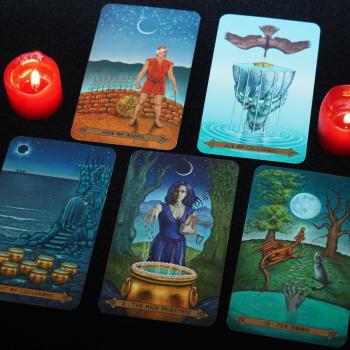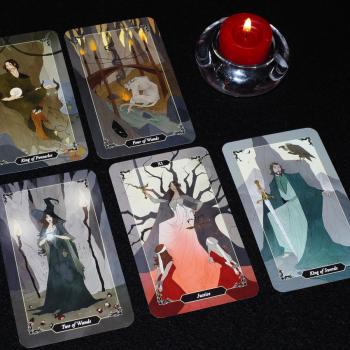Thorn Coyle posted a quote on her Facebook page on Sunday and asked for responses:
Truth to drum into the next generation: trusting your religious experiences have meaning is stupid. You have to *prove* they have meaning. – Vinay Gupta
My first response was to wonder about the context of the quote. I did a bit of googling on Vinay Gupta and didn’t turn up anything specifically related to this quote. He appears to be a futurist along the lines of John Michael Greer, only from a tech perspective instead of JMG’s historical and religious perspective. He seems to have some good ideas but also seems rather arrogant, but that’s a first impression after a quick look around the internet.
I still don’t know exactly what Vinay Gupta was trying to get across with this quote, but I think it’s worth examining it on face value.
I’m an engineer with training in math and science: “prove” is a very strong word. It’s certainly stronger than the legal standard of “a preponderance of the evidence” in civil cases and strictly speaking is stronger than the criminal standard of “beyond a reasonable doubt.” So to say you have to prove your religious experiences have meaning sets a standard that is impossible to meet.
Even if we use the looser colloquial definition, we’re still faced with the fact that most religious propositions are inherently unprovable. I believe I have experienced the presence of numerous individual Gods and Goddesses, but I can’t prove it – not even to myself. Perhaps I experienced an aspect of One Great Deity. Perhaps I experienced an archetype. Perhaps I experienced a hallucination. Perhaps I made it all up subconsciously. I can’t prove that any of those possible explanations are – or aren’t – true. The strength and consistency of my experiences are convincing, to the point that I order my life as though they are absolutely true. But that’s not proof.
Furthermore, the statement implies that we have to prove our experiences have meaning to someone else. Now, I’m not someone who thinks religion is entirely a personal thing. Religion is best practiced in community, and communities of co-religionists tend to have similar – though not identical – interpretations of their experiences. But the only person you have to convince that your experiences are meaningful is you. And conversely, if everyone else in your grove / coven / church / temple tells you your experience is wondrous but it doesn’t have meaning for you, then it is quite literally meaningless. Be informed and guided by your religious tradition but in the end you are the sole arbiter of meaning for your experiences.
That said, many of us are too quick to interpret and assign meaning to experiences, religious or otherwise. Conventional wisdom tells us to “go with your gut” and to accept the first meaning that occurs to us. When you’re trying to sort through your feelings there is some wisdom to this approach, but when you’re trying to interpret a religious experience – anything from a casual omen to full-on deity possession – more helpful meanings generally follow more deliberate reflections and interpretations.
Deliberative interpretations lower the risk that we’ll read something into a religious experience that isn’t really there. Several months ago there was a big discussion on the Pagan internet about religious anthropocentrism – the idea that it’s all about us. Other species have their own wants and needs. Perhaps the bird who looked you in the eye on your morning walk was there as a message to you from Morrigan, but perhaps he was just being neighborly. My experience is that while there are many signs and omens in Nature, most of them are for the world and humanity in general rather than for any one individual.
Our religious traditions help us to interpret our experiences using the collective wisdom of our ancestors and predecessors. Your exact experience is unique to you, but it’s not entirely unique – other people have seen omens or have been touched by Gods or have melted into Unity. The interpretations of others aren’t binding on you, but they’re a good place to start.
There is one ultimate proof that our religious experiences have meaning, and that those meanings are proper: are they helpful? Do our interpretations of our religious experiences help us live in alignment with our values? Do our experiences of the Gods help us to model the virtues of the Gods? Do they help us live in harmony with other people, other species, and other ecosystems? Do they honor our ancestors and do they help us build a better world for those who come after us?
Do they help us cope with the human condition of being alive but knowing we will die?
If they do, then you have all the proof you need – and all the proof you’re going to get.
I do wish I had more context to Vinay Gupta’s quote. Insisting on proof of the meaning of religious experiences is an arrogant demand for an impossible task. But advocating for a deliberate approach to interpretation is wise counsel.


















